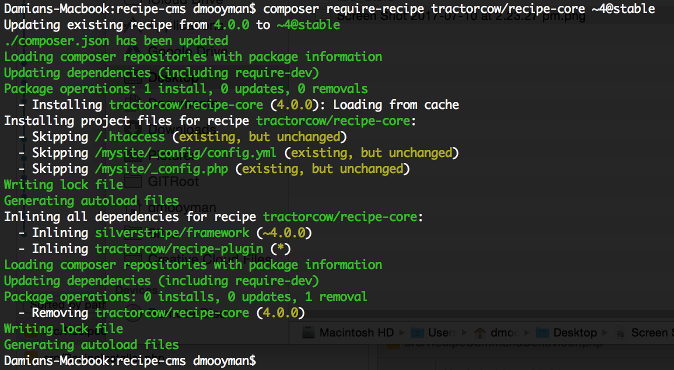silverstripe / recipe-plugin
Helper plugin to install SilverStripe recipes
Installs: 1 897 150
Dependents: 83
Suggesters: 0
Security: 0
Stars: 11
Watchers: 9
Forks: 10
Open Issues: 5
Type:composer-plugin
Requires
- php: ^8.1
- composer-plugin-api: ^2
Requires (Dev)
README
Introduction
This plugin enhances composer and allows for the installation of "silverstripe-recipe" packages. These recipes allow for the following features:
- The ability to provide project resource files. These are copied to the appropriate project root location on install, and can be safely modified by the developer. On subsequent updates to a later recipe, composer will inform the user if a project file has been updated, and will ensure new files are copied as they are introduced to the recipe.
- Recipes are composable, so resources or dependencies that are required by multiple recipes can include one another, rather than having to duplicate content.
- Recipes also can be used as a base composer project.
- A
require-recipecommand to inline a recipe into the root composer.json, allowing the developer to customise the recipe dependencies without mandating the inclusion of all requirements directly. - An
update-recipecommand to upgrade to a newer version of a recipe.
Installation
composer require silverstripe/recipe-plugin
Example output
Creating a new project
Recipes can be introduced to any existing project (even if not created on a silverstripe base project)
composer init composer require silverstripe/recipe-cms
Alternatively you can create a new project based on an existing recipe
composer create-project silverstripe/recipe-cms ./myssproject
Inlining recipes
You can "inline" either a previously installed recipe, or a new one that you would like to include dependencies for in your main project. By inlining a recipe, you promote its requirements, as well as its project files, up into your main project, and remove the recipe itself from your dependencies.
This can be done with either update-recipe, which will update a recipe, or require-recipe which will
install a new recipe.
Note that if you wish to run this command you must first install either a recipe via normal composer commands, or install the recipe plugin:
composer init composer require silverstripe/recipe-plugin composer require-recipe silverstripe/recipe-cms
or
composer init composer require silverstripe/recipe-cms composer update-recipe silverstripe/recipe-cms
Removing recipe dependencies or files
Any project file installed via a recipe, or any module installed by inlining a recipe, can be easily removed. Subsequent updates to this recipe will not re-install any of those files or dependencies.
In order to ensure this, a record of all inlined modules, and all installed files are stored in composer.json as below.
{
"extra": {
"project-files-installed": [
"mysite/code/Page.php",
"mysite/code/PageController.php"
],
"project-dependencies-installed": {
"silverstripe/admin": "2.0.x-dev",
"silverstripe/asset-admin": "2.0.x-dev",
}
}
}
To remove a file, simply delete it from the folder your project is installed in, but don't modify
project-files-installed (as this is how composer knows what not to re-install).
Likewise to remove a module, use composer remove <module> and it will be removed. As above, don't
modify project-dependencies-instaleld, otherwise that module will be re-installed on subsequent
composer update-recipe.
Un-doing a deleted project file / dependency
If you have deleted a module or file and want to re-install it you should remove the appropriate
entry from either 'project-files-installed' or 'project-dependencies-installed' and then run
composer update-recipe <recipe> again.
The file or module will be re-installed.
Removing recipes
As installation of a recipe inlines all dependencies and passes ownership to the root project,
there is no automatic removal process. To remove a recipe, you should manually remove any
required module that is no longer desired via composer remove <module>.
The provide reference to the recipe can also be safely removed, although it has no practical result
other than to disable future calls to update-recipe on this recipe.
Installing or upgrading recipes without inlining them
If desired, the optional inline behaviour of recipes can be omitted. Simply use the composer commands require and
update in place of require-recipe and update-recipe respectively. This will not disable the project files
feature, but will not inline the recipe directly, keeping your root composer.json from getting cluttered.
If you have already inlined a recipe, it will be necessary to manually remove any undesired inlined requirements
manually, and the recipe will need to be included with require subsequently.
Note that using this method it's not necessary to include the silverstripe/recipe-plugin in the root project
for this to work.
Recipe composer.json schema
Recipe types should follow the following rules:
- No mandatory resources, other than project files.
- Recipes must not rely on
autoloadas this are discarded on inline. Likewise any*-devor other root-only options should not be used, as these are ignored outside of the root project. The exception to this is when these values are useful as a base project only. - The
typemust besilverstripe-recipe - The
requiremust havesilverstripe/recipe-pluginas a dependency. extra.project-filesmust be declared as a list of wildcard patterns, matching the files in the recipe root as they should be copied to the root project. The relative paths of these resources are equivalent.extra.public-filesmust be declared for any files which should be copied to thepublicweb folder. If the project in question doesn't have any public folder, these will be copied to root instead. Note that all public files must be committed to the recipepublicfolder.
An example recipe:
{
"name": "silverstripe/example-recipe",
"description": "Example silverstripe recipe",
"type": "silverstripe-recipe",
"require": {
"silverstripe/recipe-plugin": "^1.0",
"silverstripe/recipe-cms": "^5.0",
"silverstripe/blog": "^4.0",
"silverstripe/lumberjack": "^3.0",
},
"extra": {
"project-files": [
"mysite/_config/*.yml",
"mysite/code/MyBlogPage.php"
"client/src/*"
],
"public-files": [
"client/dist/*"
]
},
"prefer-stable": true,
"minimum-stability": "dev"
}
The files within this recipe would be organised in the structure:
client/
src/
blog.scss
mysite/
_config/
settings.yml
code/
MyBlogPage.php
public/
client/
dist/
blog.css
composer.json

